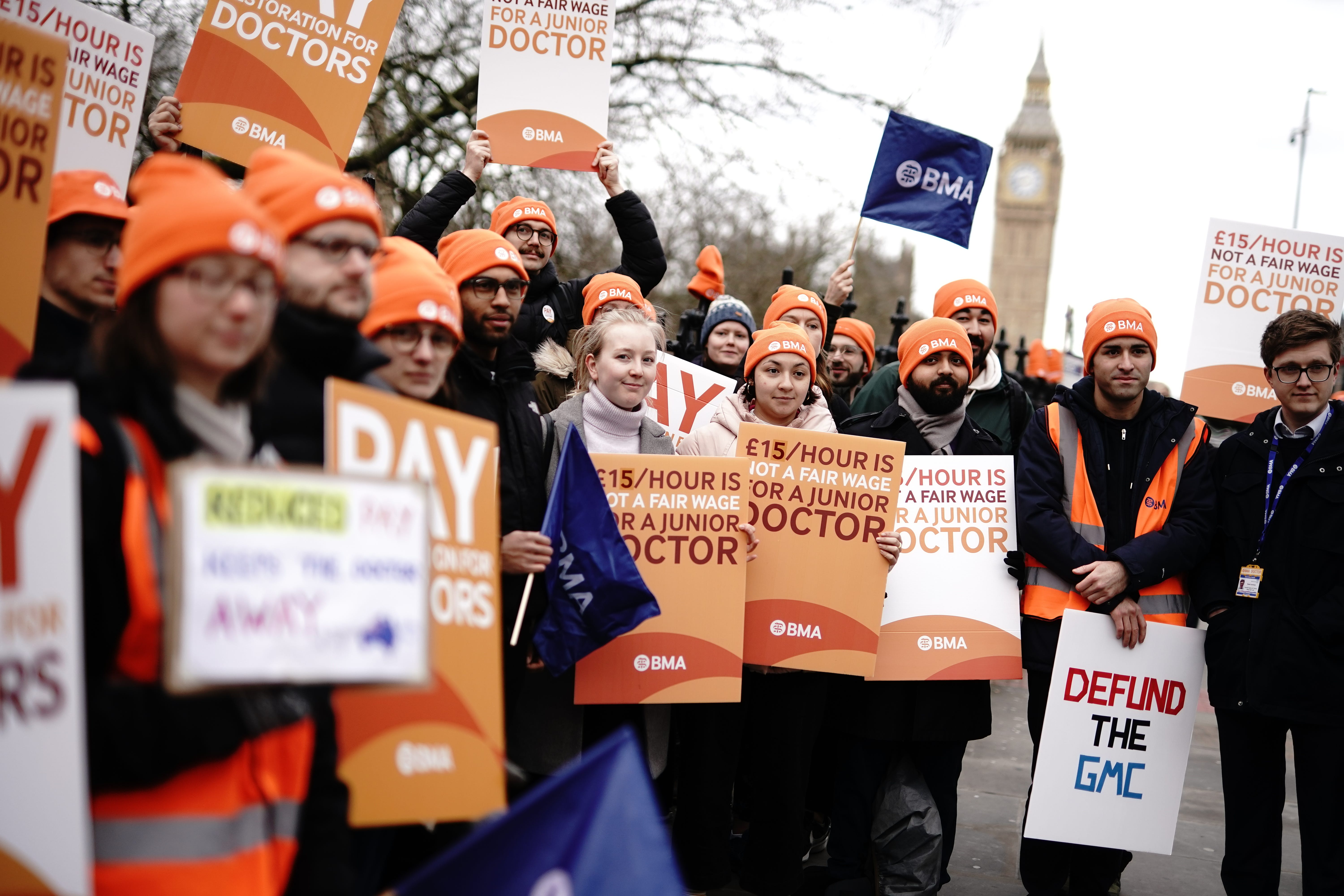NHS in England under ‘severe pressure’ as strike action continues – health chief
Junior doctors have walked out for the 10th time since March as the bitter row with the Government over pay continues.

The NHS in England is under “severe pressure” as junior doctors continue strike action across England, health leaders have said.
Professor Sir Stephen Powis, national medical director for NHS England, said staff are working “extremely hard to prioritise life-saving care”.
Junior doctors have walked out for the 10th time since March as the bitter row with the Government over pay continues.
Sir Stephen said: “Staff and services continue to be under significant pressure as the NHS deals with the impact of industrial action and an already busy winter period, and they are working extremely hard to prioritise life-saving care.”
It comes after Prime Minister Rishi Sunak has insisted that he does not want to “run down” the NHS.
Mr Sunak told BBC Radio York: “I come from an NHS family, of course I don’t want to run it down.
“We’re putting a record amount of investment in, more funding, so that’s never been higher – more doctors, more nurses, and we’re making improvements.
“Now, look, that’s not going to happen overnight. But if you look at the performance of ambulances and emergency departments this winter, it’s better than it was last winter. So that is progress.”
He added: “When it comes to the waiting lists, in the last few months actually we’ve seen the waiting lists start to fall. And that’s because we haven’t had as much industrial action.
“Obviously there is once again industrial action, but at the end of last year we had no industrial action in October or November and the waiting list fell by about 150,000.”
Mr Sunak continued: “Are we where we want to be? Not yet. Are we making progress? Yes, the plan is working. If we stick with it, I know that things will get better.”
Dr Robert Laurenson, co-chairman of the British Medical Association (BMA) junior doctors committee, claimed that the Government is “quite happy having the strikes happen” and that ministers do not want to end the dispute.
Speaking from a picket line at St Thomas’ Hospital in Westminster, Dr Laurenson told the PA news agency: “I don’t think the Government wants to end this dispute.
“I think they are quite happy having the strikes happen. And I think they are failing everyone.
“I find it difficult to understand if this is incompetence or malice. Either way, it fails everyone.”
Dr Laurenson added: “This round of action is because back in December the Secretary of State (Victoria Atkins) said she would be back around the table in 20 minutes with another offer to make. But those 20 minutes turned into 20 days.
“So then she sent a junior minister who said they had no further offer up his sleeve, so the Government lied.”
Another doctor on the picket line outside St Thomas’ expressed his disappointment that junior doctors were having to stage more walkouts.
Dr Joseph Kendall, 30, a psychiatry doctor from Kent, said: “The only thing the Government listens to is strike action.
“There is no real engagement to reach a deal for staff.
“It is really disappointing because none of us want to be on strike. We really don’t. We want to be at work. But I don’t want to be in a situation where I am seeing more and more colleagues leaving the country, and less and less doctors staying in training.”
In response to Mr Sunak’s remarks on waiting lists, Dr Kendall said: “When you talk about waiting lists, it is just disingenuous to point the blame at our door.
“You’re looking at a waiting list of 7.6 million. That hasn’t occurred because of junior doctor strikes.”
Junior doctors are calling for pay restoration, saying that they have faced real-terms pay cuts of more than a quarter since 2008.
The latest industrial action began at 7am on Saturday, with junior doctors returning to work at 11.59pm on Wednesday.
Sir Stephen added: “As ever, we are grateful to the public for using services wisely at this time. If it’s a life-threatening emergency, please use 999 and A&E as normal.
“For everything else, 111 online and community services like GPs and pharmacies are open as usual for help and advice.”
A Department of Health and Social Care spokesperson said: “The Secretary of State was clear she would meet the BMA within 20 minutes if they called off the January strikes. The BMA did not cancel its strikes.
“During negotiations in December, we made clear that we were prepared to go further than the pay increase of up to 10.3% that they have already received – but they refused to put this offer to members.
“The department has engaged repeatedly with the BMA Junior Doctors Committee following the end of their strike action in January.”
Bookmark popover
Removed from bookmarks